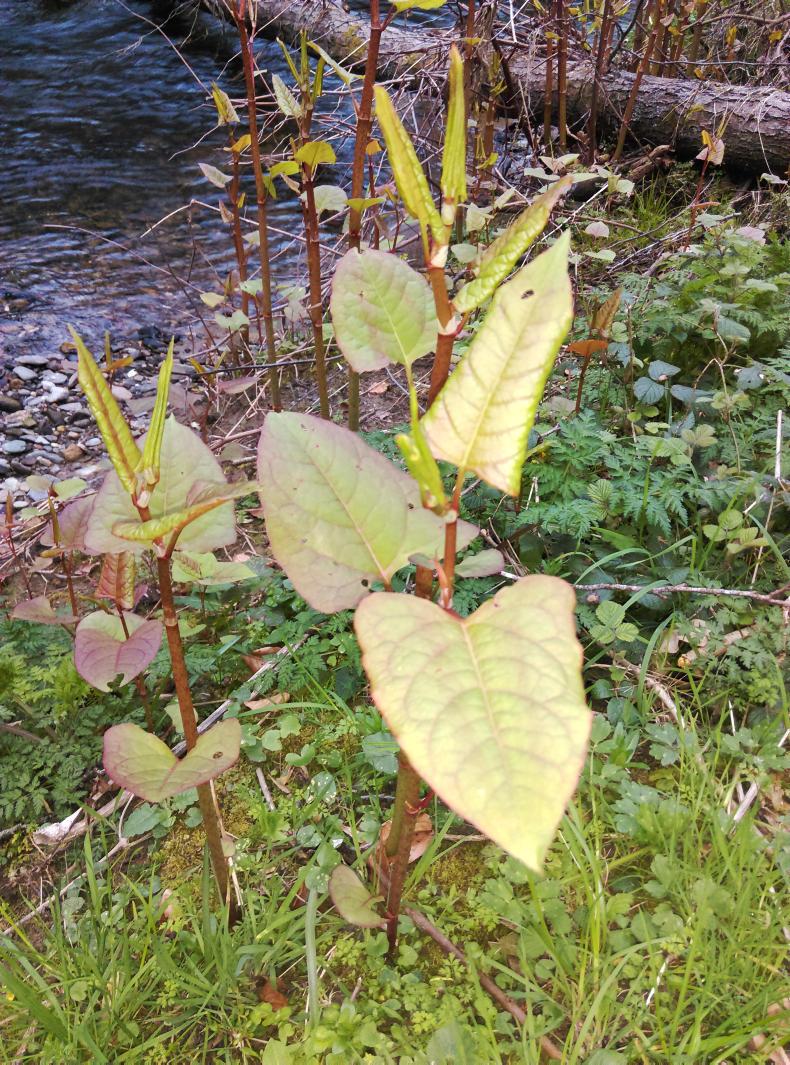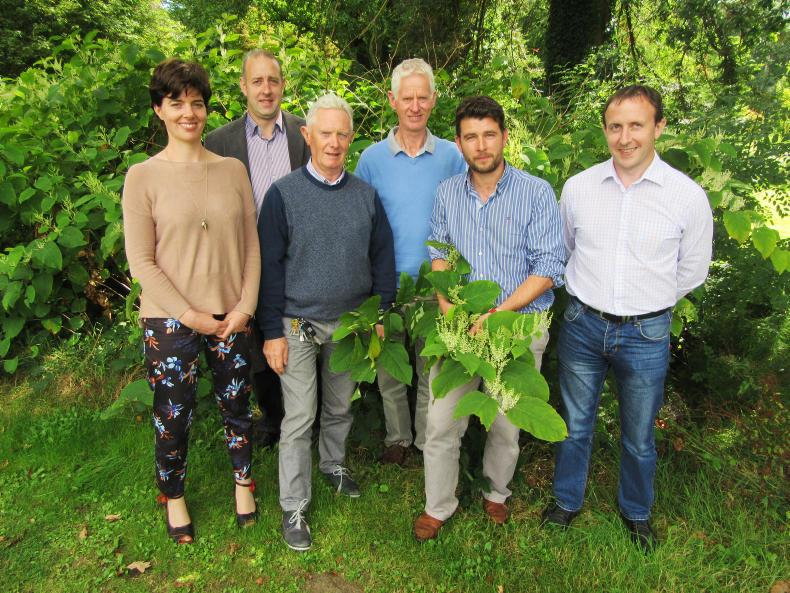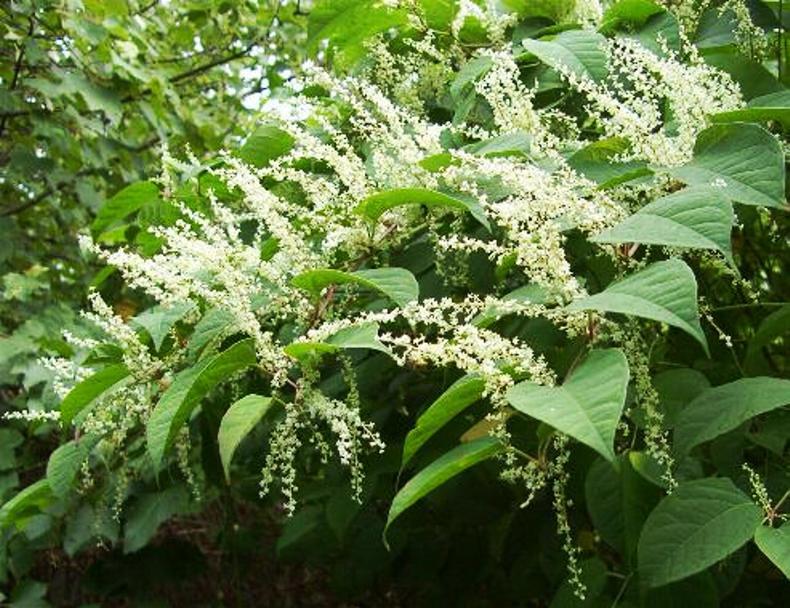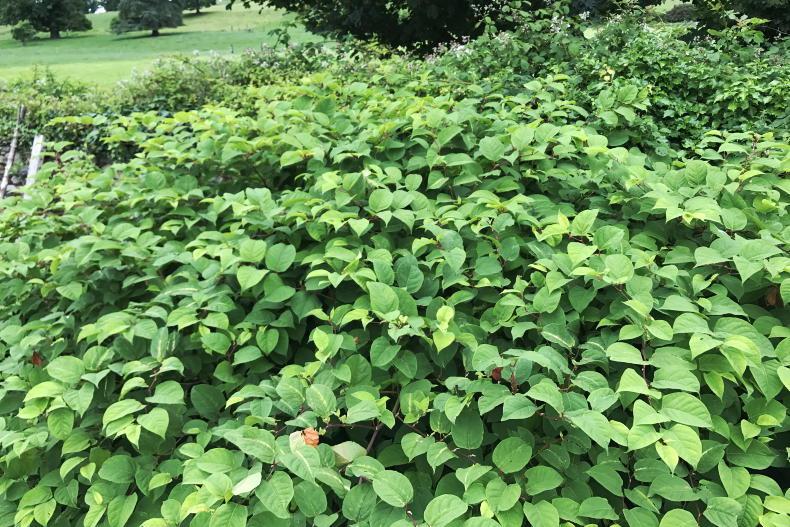As the hedge cutting season gets under way in earnest, farmers and contractors have been warned not to touch Japanese knotweed.
The advice comes from the newly formed Teagasc Invasive Alien Species Working Group.
The group is trying to raise awareness of alien invasive species and provide much-needed information to the agriculture industry. It is estimated that invasive species and non-native species cost Ireland €261m every year.
The group includes experts from Teagasc, the National Biodiversity Data Centre, Government departments, farming representatives, Coillte and industry stakeholders.

A newly-emerged shoot of Japanese knotweed (Fallopia japonica), currently one of the most widespread invasive alien species in Ireland. Deboragh Darcy
“While we do not have all the answers, there is a lot of information available about what to do, and more importantly, what not to do,” said Catherine Keena, Teagasc’s countryside management specialist.
She called on farmers and contractors to watch out for Japanese Knotweed, currently one of the most widespread invasive alien species in Ireland.
The advice is not to cut, mow, strim or disturb this plant. The optimum time to control Japanese Knotweed with the herbicide glyphosate is when the plant has flowered.
“It is vitally important to seek professional advice and always follow product label requirements before embarking on control as improper treatment can make the problem worse,” she warned. “Control leading to eradication is likely to take several years.”

Members of the new Teagasc Invasive Alien Species Working Group pictured next to Japanese knotweed: Colette O'Flynn, National Biodiversity Data Centre; Thomas Cooney, IFA environment chair; Jim O'Mahony, tillage and horticulture consultant; Joe Caffrey, INVAS Biosecurity; David Devaney, Teagasc Kildalton Open Source Farm; and Jerome Walsh, Department of Agriculture.
Invasive alien species
Colette O’Flynn from the National Biodiversity Data Centre said that invasive alien plant species are non-native species that have been introduced into Ireland by human intervention.
They can have serious consequences for both farms and wildlife as they can cause damage to the environment, economy and human health.
All farms at risk
David Devaney from the Open Source Farm, based in Teagasc Kildalton, said all farms are at risk from invasive alien species, hence the need for farmers to be able to identify them and to maintain a high level of vigilance. This topic will be covered at the forthcoming GLAS training courses.
Read more
Japanese knotweed could affect farm payments
Identifying the dreaded invader: Japanese knotweed
Japanese knotweed plights begins to hit agriculture
As the hedge cutting season gets under way in earnest, farmers and contractors have been warned not to touch Japanese knotweed.
The advice comes from the newly formed Teagasc Invasive Alien Species Working Group.
The group is trying to raise awareness of alien invasive species and provide much-needed information to the agriculture industry. It is estimated that invasive species and non-native species cost Ireland €261m every year.
The group includes experts from Teagasc, the National Biodiversity Data Centre, Government departments, farming representatives, Coillte and industry stakeholders.

A newly-emerged shoot of Japanese knotweed (Fallopia japonica), currently one of the most widespread invasive alien species in Ireland. Deboragh Darcy
“While we do not have all the answers, there is a lot of information available about what to do, and more importantly, what not to do,” said Catherine Keena, Teagasc’s countryside management specialist.
She called on farmers and contractors to watch out for Japanese Knotweed, currently one of the most widespread invasive alien species in Ireland.
The advice is not to cut, mow, strim or disturb this plant. The optimum time to control Japanese Knotweed with the herbicide glyphosate is when the plant has flowered.
“It is vitally important to seek professional advice and always follow product label requirements before embarking on control as improper treatment can make the problem worse,” she warned. “Control leading to eradication is likely to take several years.”

Members of the new Teagasc Invasive Alien Species Working Group pictured next to Japanese knotweed: Colette O'Flynn, National Biodiversity Data Centre; Thomas Cooney, IFA environment chair; Jim O'Mahony, tillage and horticulture consultant; Joe Caffrey, INVAS Biosecurity; David Devaney, Teagasc Kildalton Open Source Farm; and Jerome Walsh, Department of Agriculture.
Invasive alien species
Colette O’Flynn from the National Biodiversity Data Centre said that invasive alien plant species are non-native species that have been introduced into Ireland by human intervention.
They can have serious consequences for both farms and wildlife as they can cause damage to the environment, economy and human health.
All farms at risk
David Devaney from the Open Source Farm, based in Teagasc Kildalton, said all farms are at risk from invasive alien species, hence the need for farmers to be able to identify them and to maintain a high level of vigilance. This topic will be covered at the forthcoming GLAS training courses.
Read more
Japanese knotweed could affect farm payments
Identifying the dreaded invader: Japanese knotweed
Japanese knotweed plights begins to hit agriculture













SHARING OPTIONS